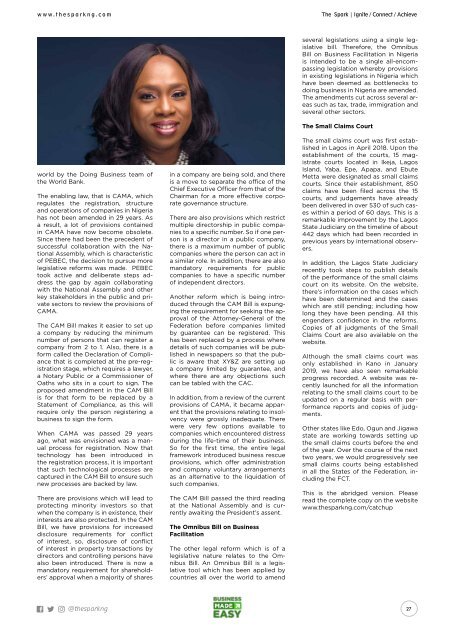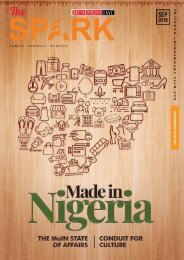Create successful ePaper yourself
Turn your PDF publications into a flip-book with our unique Google optimized e-Paper software.
www.thesparkng.com<br />
The Spark | Ignite / Connect / Achieve<br />
world by the Doing <strong>Business</strong> team of<br />
the World Bank.<br />
The enabling law, that is CAMA, which<br />
regulates the registration, structure<br />
and operations of companies in Nigeria<br />
has not been amended in 29 years. As<br />
a result, a lot of provisions contained<br />
in CAMA have now become obsolete.<br />
Since there had been the precedent of<br />
successful collaboration with the National<br />
Assembly, which is characteristic<br />
of PEBEC, the decision to pursue more<br />
legislative reforms was made. PEBEC<br />
took active and deliberate steps address<br />
the gap by again collaborating<br />
with the National Assembly and other<br />
key stakeholders in the public and private<br />
sectors to review the provisions of<br />
CAMA.<br />
The CAM Bill makes it easier to set up<br />
a company by reducing the minimum<br />
number of persons that can register a<br />
company from 2 to 1. Also, there is a<br />
form called the Declaration of Compliance<br />
that is completed at the pre-registration<br />
stage, which requires a lawyer,<br />
a Notary Public or a Commissioner of<br />
Oaths who sits in a court to sign. The<br />
proposed amendment in the CAM Bill<br />
is for that form to be replaced by a<br />
Statement of Compliance, as this will<br />
require only the person registering a<br />
business to sign the form.<br />
When CAMA was passed 29 years<br />
ago, what was envisioned was a manual<br />
process for registration. Now that<br />
technology has been introduced in<br />
the registration process, it is important<br />
that such technological processes are<br />
captured in the CAM Bill to ensure such<br />
new processes are backed by law.<br />
There are provisions which will lead to<br />
protecting minority investors so that<br />
when the company is in existence, their<br />
interests are also protected. In the CAM<br />
Bill, we have provisions for increased<br />
disclosure requirements for conflict<br />
of interest, so, disclosure of conflict<br />
of interest in property transactions by<br />
directors and controlling persons have<br />
also been introduced. There is now a<br />
mandatory requirement for shareholders’<br />
approval when a majority of shares<br />
in a company are being sold, and there<br />
is a move to separate the office of the<br />
Chief Executive Officer from that of the<br />
Chairman for a more effective corporate<br />
governance structure.<br />
There are also provisions which restrict<br />
multiple directorship in public companies<br />
to a specific number. So if one person<br />
is a director in a public company,<br />
there is a maximum number of public<br />
companies where the person can act in<br />
a similar role. In addition, there are also<br />
mandatory requirements for public<br />
companies to have a specific number<br />
of independent directors.<br />
Another reform which is being introduced<br />
through the CAM Bill is expunging<br />
the requirement for seeking the approval<br />
of the Attorney-General of the<br />
Federation before companies limited<br />
by guarantee can be registered. This<br />
has been replaced by a process where<br />
details of such companies will be published<br />
in newspapers so that the public<br />
is aware that XY&Z are setting up<br />
a company limited by guarantee, and<br />
where there are any objections such<br />
can be tabled with the CAC.<br />
In addition, from a review of the current<br />
provisions of CAMA, it became apparent<br />
that the provisions relating to insolvency<br />
were grossly inadequate. There<br />
were very few options available to<br />
companies which encountered distress<br />
during the life-time of their business.<br />
So for the first time, the entire legal<br />
framework introduced business rescue<br />
provisions, which offer administration<br />
and company voluntary arrangements<br />
as an alternative to the liquidation of<br />
such companies.<br />
The CAM Bill passed the third reading<br />
at the National Assembly and is currently<br />
awaiting the President’s assent.<br />
The Omnibus Bill on <strong>Business</strong><br />
Facilitation<br />
The other legal reform which is of a<br />
legislative nature relates to the Omnibus<br />
Bill. An Omnibus Bill is a legislative<br />
tool which has been applied by<br />
countries all over the world to amend<br />
several legislations using a single legislative<br />
bill. Therefore, the Omnibus<br />
Bill on <strong>Business</strong> Facilitation in Nigeria<br />
is intended to be a single all-encompassing<br />
legislation whereby provisions<br />
in existing legislations in Nigeria which<br />
have been deemed as bottlenecks to<br />
doing business in Nigeria are amended.<br />
The amendments cut across several areas<br />
such as tax, trade, immigration and<br />
several other sectors.<br />
The Small Claims Court<br />
The small claims court was first established<br />
in Lagos in April 2018. Upon the<br />
establishment of the courts, 15 magistrate<br />
courts located in Ikeja, Lagos<br />
Island, Yaba, Epe, Apapa, and Ebute<br />
Metta were designated as small claims<br />
courts. Since their establishment, 850<br />
claims have been filed across the 15<br />
courts, and judgements have already<br />
been delivered in over 530 of such cases<br />
within a period of 60 days. This is a<br />
remarkable improvement by the Lagos<br />
State Judiciary on the timeline of about<br />
442 days which had been recorded in<br />
previous years by international observers.<br />
In addition, the Lagos State Judiciary<br />
recently took steps to publish details<br />
of the performance of the small claims<br />
court on its website. On the website,<br />
there’s information on the cases which<br />
have been determined and the cases<br />
which are still pending; including how<br />
long they have been pending. All this<br />
engenders confidence in the reforms.<br />
Copies of all judgments of the Small<br />
Claims Court are also available on the<br />
website.<br />
Although the small claims court was<br />
only established in Kano in January<br />
2019, we have also seen remarkable<br />
progress recorded. A website was recently<br />
launched for all the information<br />
relating to the small claims court to be<br />
updated on a regular basis with performance<br />
reports and copies of judgments.<br />
Other states like Edo, Ogun and Jigawa<br />
state are working towards setting up<br />
the small claims courts before the end<br />
of the year. Over the course of the next<br />
two years, we would progressively see<br />
small claims courts being established<br />
in all the States of the Federation, including<br />
the FCT.<br />
This is the abridged version. Please<br />
read the complete copy on the website<br />
www.thesparkng.com/catchup<br />
@the<br />
sp<br />
ark<br />
ng<br />
27

















